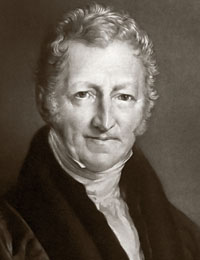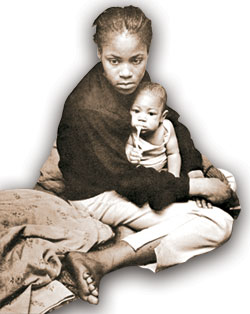As we already made clear, Darwin's views in The Origin of Species were most influenced by the British economist and demographer Thomas Robert Malthus.
In Essay on the Principle of Population, as it Affects the Future, first published in 1798, Malthus claimed that the human population was increasing every twenty-five years in a geometrical ratio (1, 2, 4, 8, 16, 32, 64, 128, 256…), while the food supply was increasing in an arithmetical ratio (1, 2, 3, 4, 5, 6, 7, 8, 9...); that as the population doubled, food resources showed a much more modest rise. Malthus claimed that within 300 years, the ratio of population to food resources would be 4,096 to 13. Again according to this unscientific claim, resources were insufficient for the rapidly rising population, and Malthus alleged that it was becoming essential to engage in a serious struggle for survival. This was the same claim expressed in the subtitle to Darwin's The Origin of Species: the Preservation of Favoured Races in the Struggle for Life...
 |
| Thomas Robert Malthus |
In his Essay, Malthus stated that this rapid population rise needed to be halted, and came up with a number of solutions. According to him, misery and vice were the two main factors that checked population growth. Phenomena such as famine and epidemics were examples of misery, which kept population in check. Other examples were such phenomena as wars. Malthus wrote that rapid population increase could be checked by such means as war, famine, disease and the killing of newborn babies, to balance population and food resources. Anyone with common sense and a conscience will agree that such a claim is irrational, illogical, and horrendously brutal. Accurate planning of income and essential resources for the well-being and peace of societies is of course of the greatest importance for the future of those societies. However, it is also evident that planning wars, slaughter and murder will inflict nothing but tears and suffering on a society's future.
Malthus had a number of other illogical recommendations. For example, he suggested that all possible measures should be taken to prevent poor or laboring-class couples from having children. Malthus's views reached a peak in 1834 with a new law passed in England setting up special “workhouses” for the poor. Under that law, married couples in workhouses were kept apart by means of fixed rules to reduce the rise in population.
One of the factors underlying these measures was the longstanding fear that the rapidly rising numbers of the “lower classes” would eventually overwhelm more civilized individuals. That fear is groundless, of course, and the product of a grave deception. First, it is out of the question for an individual to enjoy superiority over anyone else because of his material status, social position, language, race or gender. God has created all human beings equal. What makes people valuable is the moral virtues and the fear of God they exhibit, not material means or physical attributes.
 |
| According to Social Darwinism's twisted propaganda one of the most pitiless philosophies in history the weak and powerless must be left to die.. |
In the wake of the French Revolution, however, the British middle class provided enormous support for Malthusianism. Fearing that they might no longer maintain their former pre-eminence and power, they had no hesitation over adopting radical measures to preserve them. This is one of the characteristic errors made by those who distance themselves from religious moral values. The elite of that time thought that society's future lay in there being as many wealthy and as few poor as possible. Of course it is desirable to raise the number of wealthy people and the level of well-being in a society. However, the methods implemented to increase that well-being are of greatest importance. Raising the numbers of the wealthy by slaughtering the poor and oppressing the needy, as Social Darwinism suggests, is totally unacceptable, of course. Furthermore, increasing the number of wealthy individuals is, by itself, not enough for a society to progress. If those wealthy people lack such religious moral values as honesty, altruism, modesty, patience, and tolerance, their industry will damage a society instead of benefiting it. Plans aimed at advancing societies can achieve their objective only if that society reinforces its spiritual values at the same time as it makes material progress.
However, many in Malthus's time failed to realize this manifest truth and supported the perverted views that would later lead their societies into moral collapse.
To halt the rise in population, these were some of the ruthless solutions Malthus suggested:
Instead of recommending cleanliness to the poor, we should encourage contrary habits. In our towns we should make the streets narrower, crowd more people into the houses, and court the return of the plague. In the country, we should build our villages near stagnant pools, and particularly encourage settlements in all marshy and unwholesome situations. But above all, we should reprobate [strongly condemn] specific remedies for ravaging diseases; and those benevolent, but much mistaken men, who have thought they were doing a service to mankind by projecting schemes for the total extirpation of particular disorders.8
Malthus also encouraged the death of babies:
... we are bound in justice and honour formally to disclaim the right of the poor to support. To this end, I should propose a regulation to be made, declaring, that no child born... should ever be entitled to parish assistance... The [illegitimate] infant is, comparatively speaking, of little value to the society, as others will immediately supply its place... All the children born, beyond what would be required to keep up the population to this [desired] level, must necessarily perish, unless room be made for them by the deaths of grown persons.9
Malthus possessed a sufficiently twisted logical framework as to justify letting newborns die for the future of society. You might well assume that such perverted views are a thing of the past and could no longer be accepted by anyone today. Yet that is not the case. In modern-day China, population planning is carried out by means of the killing of newborn babies—making it easy to see the permanent effects on societies of the destructive views of Malthus and his follower Darwin. The communist Chinese state seeks to prevent its own people from living by religious moral values, and looks at them through a Darwinist eye. For that reason, in addition to the enormous social and moral collapse, human beings are forced to work in labor camps devoid of the most basic humane conditions. Children of parents with already more children than the number permitted by the state are collected and killed. People are executed for “thought crimes,” the executions themselves having assumed the form of societal ceremonies. Contemporary China is an example of what awaits a society that falls under the influence of Darwinist views.
Malthus's theses not only prepared an oppressive law that further worsened the conditions of the poor in England, they also made social problems even more intractable. These theses, which still have their proponents today, and which led the way to a theory such as Darwinism which inflicted disasters like chaos, war, racism and atheism on the 20th century, have no valid scientific foundations whatsoever. Indeed, Malthus's ideas were inspired by a story relating to goats and dogs, the truth of which nobody could be sure of.
Malthus's real source of inspiration for his Essay was a story about goats on a Southeast Pacific island, said to have been left there by Juan Fernandez, a Spanish sailor. According to the tale, these goats multiplied and became a source of meat for mariners calling at the island. But the goats rapidly grew in number and began to consume all the sources of food on the island. In order to prevent British privateers—who molested Spanish trade—from making use of the goats' meat, the Spanish landed male and female dogs on the island. In time, the dogs began to grow in number, and killed most of the goats.
British Joseph Townsend wrote that in this way, a natural equilibrium was established. “The weakest of both species,” he went on to say, “were among the first to pay the debt of nature; the most active and vigorous preserved their lives. ... It is the quantity of food which regulates the number of the human species.”10
As we already stated, various natural circumstances may have an effect on an animal's numbers increasing or declining and on species surviving or becoming extinct. Yet it is a grave error to suppose that this dynamic also applies to human societies, and experience shows the terrible results of putting such an error into practice.
Under the Poor Law then in force in Great Britain, the poor were not left to go hungry, but were forced to work very hard. Townsend maintained that these laws obliging the poor to work resulted in excessive difficulties and protests. Instead, he claimed that it was more reasonable to bring the poor to heel by means of hunger. According to Townsend, “hunger will tame the fiercest animals, and will teach them civility, obedience, and subjection.”11 At the root of that ruthless and unconscionable attitude lies the error of classing people according to their material means and physical attributes. Such discrimination, totally incompatible with religious moral values, has disrupted the social order and led to chaos, anarchy and conflict throughout history.
After Townsend, the story of the goats and dogs also constituted the basis of Malthus's theses. It also represents the source of inspiration for the error expressed in the term “the survival of the fittest,” used by Herbert Spencer, and of Darwin's error of “evolution by natural selection.”
As we have already emphasized, applying to human beings certain laws that apply to animals was a great error made by a chain of people, beginning with Townsend and followed by Malthus, Spencer and Darwin. They regarded humans as savage creatures that could be reined in only by radical measures and kept under control by war, hunger and poverty. The truth is, though, that human beings are endowed with reason and common sense. They act in accordance with logic and their conscience, not according to instincts, as animals do.
 |
| God commands people to protect the needy, and to be affectionate and compassionate. The spread of the moral values He commanded will resolve a great many problems. |
Malthus's theory received support from various circles at the time, and also constituted the foundation of a number of perverted ideologies and movements in the following century. Yet it rests on no scientific foundations and is riddled with inconsistencies. For example:
1) At the time Malthus wrote, there were no data regarding population increases at his disposal. The first national census in Great Britain was carried out in 1801, three years after Malthus wrote his Essay. In any case, for Malthus to calculate the rate of population growth, he would have needed statistics for years previous to 1801. He therefore had no reliable statistics on which to base a figure for that growth, and his claims were based entirely on presupposition.
 |
2) Nor did Malthus possess any data with which to calculate the growth of food resources. At the time, there was no way of calculating how much land was under cultivation, not how many crops it produced. Again, he engaged in mere conjecture.
3) In any case, the law that Malthus proposed was contradictory in itself. He suggested that populations increased geometrically. In that case, animals and plant populations also increased geometrically, and these two form the basis of human life. In practice, however, animals, plants and human beings do not multiply geometrically: Their rates of increase vary according to prevailing circumstances. The entire ecosystem, humans included, exists within a most balanced equilibrium. The self-evident order in nature is a long way from “Eat or be eaten,” the so-called struggle for survival proposed by Malthus and Darwin.
In short, Malthus's erroneous and illogical claims rest on no scientific foundations whatsoever. Yet Darwin constructed his theory of evolution on Malthus's conjectures.
The Claim That “Life is Struggle” is Untrue | |
| Out of devotion to Malthus and Darwin, some have carried the idea that “life is struggle” to the ultimate extremes, claiming that not just animals, but all living things compete with one another. The German embryologist Wilhelm Roux claimed that organs were struggling with each other for nourishment, kidneys against lungs, heart against brain. T. H. Huxley even maintained that all the molecules within each organism were competing with each other!1 Biological discoveries of the 20th century showed that no such struggle goes on in nature. Today's biologists refer not to competition as the basis of the organism, but to cooperation. For example, in his book The Lives of a Cell, the biologist Thomas Lewis writes: Most of the associations between the living things we know about are essentially cooperative ones, symbiotic in one degree or another; when they have the look of adversaries, it is usually a standoff relation, with one party issuing signals, warnings, flagging the other off...2
Norman Macbeth, author of Darwin Retried: an Appeal to Reason, describes how Malthus and Darwin were mistaken and how there are no struggles to the death in nature: Darwin took it over from Malthus, who was a sociologist (and a grim one) rather than a biologist. It was not derived from a loving contemplation of plants and animals. Such a contemplation... would not show that “each organic being was striving to increase at a geometrical ratio” or that there was continual struggle...3 In his book Mutual Aid: A Factor of Evolution, Peter Kropotkin describes the error into which Darwin and his supporters fell: The numberless followers of Darwin reduced the notion of struggle for existence to its narrowest limits. They came to conceive the animal world as a world of perpetual struggle among half-starved individuals, thirsting for one another's blood… if we take Huxley… the animal world is on about the same level as a gladiators' show. The creatures are fairly well treated, and set to, fight hereby the strongest, the swiftest, and the cunningest live to fight another day… But it may be remarked at once that Huxley's view of nature had as little claim to be taken as a scientific deduction.4 An article in the Turkish scientific journal Bilim ve Teknik (Science and Technology Magazine) admits the error in claiming that nature is a battleground: The problem is why living things help one another. According to Darwin's theory, every organism carries out a struggle to survive and reproduce. Since helping others would reduce that creature's odds to survive, evolution in the long term should have eliminated that behavior. It has been observed, however, that living things can be altruistic.5 Together, these facts reveal once again that Darwin's theory, produced under primitive scientific conditions, is filled with errors and deceptions. A great many branches of science reveal the invalidity of the theory of evolution. Those who support it, supposedly in the name of science, must not ignore the responsibility they assume in supporting such an unscientific theory, and must abandon this error at once. NOTES 1. http://www.trufax.org/avoid/manifold.html 2. L. Thomas, The Lives of a Cell, New York: Bantam Books INC., (1974) 3. www.trufax.org/avoid/manifold.html 4. Peter Kropotkin, Mutual Aid: A Factor of Evolution, 1902, I. Bölüm. 5. Bilim ve Teknik, sayı 190, s.4 |
 |
| Malthus's distorted logic was also applied to children, many of whom were forced to work under very harsh conditions. |
In his autobiography, Darwin wrote:
In October 1838, that is fifteen months after I had begun my systematic enquiry, I happened to read for amusement Malthus on Population, and being well prepared to appreciate the struggle for existence that everywhere goes on from long-continued observation of the habits of animals and plants, it at once struck me that under these circumstances, favourable variations would tend to be preserved and unfavourable ones to be destroyed. The result of this would be the formation of new species. Here, then, Ihad at last got a theory by which to work...12
The concepts of evolution by natural selection and the struggle for survival took shape in Darwin's mind after reading Malthus. In The Origin of Species Darwin admitted that he had fully accepted Malthus's claims:
There is no exception to the rule that every organic being naturally increases at so high a rate, that, if not destroyed, the earth would soon be covered by the progeny of a single pair. Even slow-breeding man has doubled in twenty-five years, and at this rate, in less than a thousand years, there would literally not be standing-room for his progeny.13
 |
Darwin described the relationship between Malthus's theory and the thesis of natural selection thus:
As more individuals are produced than can possibly survive, there must in every case be a struggle for existence, either one individual with another of the same species, or with the individuals of distinct species, or with the physical conditions of life. It is the doctrine of Malthus applied with manifold force to the whole animal and vegetable kingdoms.14
These ideas of Darwin's, which found support in the twisted thinking of Malthus, possess no scientific value. Moreover, this cruel perspective maintains that population planning can be ensured by eliminating the weak and poor, and preaches that the weak need to be destroyed. Regarding life not as based on peace, security and understanding, but as a matter of mere survival necessitating a ruthless struggle, it inflicted the most terrible catastrophes on societies.
 |
| According to Malthus, the “lower class” had to be brought under control, oppressed, weakened and made to work. When his twisted view was accepted, the working class was forced to labor under the most appalling conditions. |
Although Malthus and Darwin's views lacked any scientific foundation, they received wide support. We need to seek the reason for this in the period in which they both lived, which was post-Industrial Revolution England. Following the Industrial Revolution, the British aristocracy feared it would surrender its status and power to the working class. On the other hand, they needed a larger, cheap work force. As a result of that dilemma, the ruling class in Britain drew the conclusion that the “lower class” had to be weakened, brought under control, oppressed, and put to work. In stating that food resources were insufficient in the face of a rapidly rising population, Malthus suggested that the solution lay in preventing the “lower orders” from multiplying, thus causing a number of measures to be taken against the poor. By applying Malthus's thesis to natural sciences and biology, Darwin provided the claim with a fictitious scientific guise.
In his book Social Darwinism in American Thought, Richard Hofstadter says this about Darwin's support for Malthus's thesis:
Malthusianism had become popular in England... it had also been used to relieve the rich of responsibility for the sufferings of the poor. Malthus had been proved wrong by the course of events; and just when his theory was dying out in political economy it received fresh support from Darwinian biology.15
In an article, researcher and author Ian Taylor has this to say about the degenerate ideas in Malthus's thesis:
 |
| Those in need of a cheap workforce were the first to support Malthus's misguided views. |
The lesson in all this is that Darwin and others who reject both God and the promise of His providence and intervention have found in the Malthus principle a terrifying spectre of tragedy and despair that has driven them into unspeakable ethical and absurd scientific propositions. This in spite of the obvious weaknesses and deficiencies in Malthus argument.16
Although science refuted Malthus's “ruthless, despair-inducing, nonsensical” claim, it has still managed to remain influential up to the present day. Ian Taylor's book In the Minds of Men summarizes the chain of ruthlessness that began with Malthus and ended with Hitler:
The maxim on which Malthus based his thinking was what later became the “survival of the fittest” theme. The notion can be traced from Condorcet to Malthus, to Spencer, to Wallace, and to Darwin. It eventually mushroomed out to influence men such as Adolf Hitler, but we should be reminded that it all began in the tale of the goats and dogs.17
As we have seen, various administrators and leaders sought to use Malthus's opinions to mask their own interests. Various opinion formers with their own ideological concerns played an important role in those views receiving such wide acceptance. The disasters caused by the support given to this ruthless world view, were on a scale never been seen before. In the following pages, we shall examine how this merciless world view that began with Malthus gained strength under the name of Social Darwinism—and what it cost humanity.
8. Thomas R. Malthus, An Essay on the principle of population as it affects the future improvement of society, Reprint, London: Reeves and Turner, (1798) 1878, p. 412. (emphasis added)
9. Ibid., pp. 430-431, 411. (emphasis added)
10. Karl Polanyi, The Great Transformation, Boston: Beacon Press, 1957, p. 112.
11. Ibid.
12. Sir Gavin de Beer, Charles Darwin, London : Thomas Nelson & Sons, 1963.
13. C. Darwin, On the Origin of Species by Means of Natural Selection, London, 1859, 2nd edition 1964, Cambridge:Harvard University Press, p. 64.
14. Ibid.
15. Hofstadter, Social Darwinism in American Thought, p. 88.
16. Ian Taylor, "Historical Sketch: Robert Thomas Malthus (1766-1834);" http://www.creationism.org/csshs/v04n3p18.htm
17. Ian Taylor, In the Minds of Men, Toronto: TFE Publishing, 3rd. ed., 1991, p. 65.